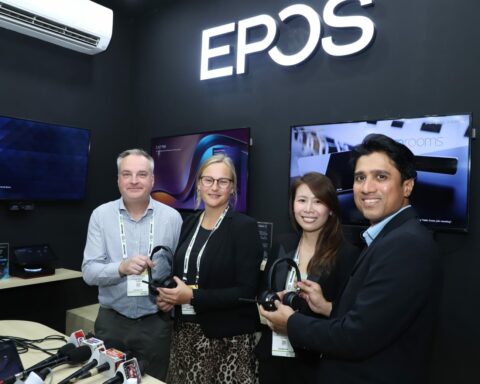EPOS audio solutions built on EPOS BrainAdaptTM technologies can improve performance and reduce cognitive load
Global audio and video brand EPOS has today launched findings examining the impact poor audio quality is having on the productivity levels of remote workers. The research found that poor audio quality causes our brains to work harder to process information. EPOS also found that the brain undergoes significant strain when struggling to process digital audio in comparison to sounds in a physical environment.
Following the onset of COVID-19, there has been an influx of research on the long-lasting cognitive issues related to the global health crisis as well as how lockdowns and other societal shifts have affected mental health. However, there has been little research on the impact of communicating primarily through digital solutions. Sound significantly impacts cognitive function because the ear is just a vehicle to the brain that perceives and translates a series of electronic nerve signals. With much of the global workforce continuing to work remotely, background noises remain an impediment to productivity and potentially a risk to health, as it relates to levels of stress. Workforces today are largely unaware of how background noises affect them, and it is only by addressing the issue that we can begin to unlock new levels of wellbeing and productivity.
The psychoacoustic research was conducted by EPOS in the Centre for Applied Audiology Research (CAAR) , Oticon, Denmark, with a focus on pupillometry tracking, speech recognition performance and subjective ratings for pre- and post-load tasks for each noise condition. The users performed the listening tasks with and without EPOS passive damping. The researchers concluded that the passive noise reduction performance of EPOS headsets leads to a reduction in effort listening, better memory recall and higher levels of word recognition, with subjects’ memory recall improving by 10%.
Listeners enduring noisy backgrounds can struggle to interpret and understand the entirety of what’s being discussed. While that raises immediate concerns for the absorption and retention of information, the longer-term issue is clear. Poor audio causes our brains to work harder to interpret information and experience 35% more effort listening . The brain can become much slower to respond to sound as it finds it trickier to switch between stimuli. For instance, when on a conference call that is marred by audio issues including background noise and interference, the brain works harder to focus on what the most important source of sound is.
This, the researchers contend, can lead to cognitive overload and brain fatigue. Sound affects us psychologically, cognitively, and behaviorally, even though we are not aware of it. By testing EPOS’ technologies and solutions, and examining cognitive effort and memory recall, it is possible to develop solutions to mitigate the effects of unwanted background noise on the brain. For example, EPOS can test and prove that damping specific frequencies of disturbing noises really does result in lower listening fatigue over an extended virtual meeting.
Built on world-leading psychoacoustic research through the Demant Group, EPOS has developed unique algorithms and acoustic technologies to replicate the ideal and most natural conditions for a user’s brain to interpret sounds. These technologies fall under the EPOS BrainAdapt™ banner. Products built on EPOS BrainAdapt™ technologies, such as the ADAPT 660 and ADAPT 660 AMC headsets were shown to enhance performance through improved recall and reduced cognitive load.
Torben Christiansen, Director of Technology, EPOS: “Businesses invested hugely in technologies to support their workforces during lockdowns. That was a necessary fix to an immediate threat to business continuity. Now, we’re starting to see the longer-term impacts of remote work on our employees’ productivity and wellbeing. Poorer concentration and productivity have an immediate impact on business output, but the more insidious and cumulative effect will be that of increased fatigue and dissatisfaction amongst workers. This, in turn, can lead to burnout and employee churn. Employers need to face down these new challenges with the same rigor they did in 2020, and invest in new solutions to support their employees’ wellbeing, satisfaction, and productivity.”





